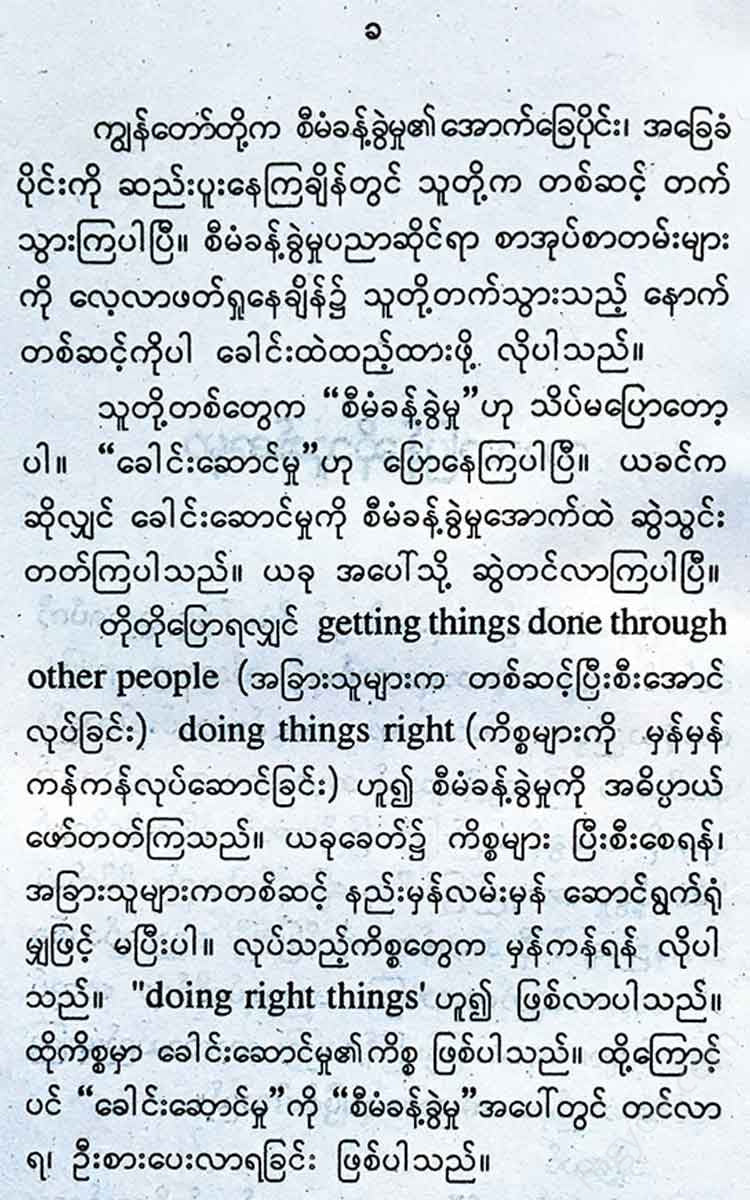စိတ်ကူးချိုချိုစာပေ
Khin Maung Nyo (Economics) - Principle-centered leadership
Khin Maung Nyo (Economics) - Principle-centered leadership
Couldn't load pickup availability
Principle-centered approach
“I often invite people to my talks to present their most difficult problems or ask their most difficult questions. These are conflicts and problems that cannot be solved by conventional means. Here are some examples:
"How do you balance your personal life and work life when you're constantly facing crises and pressures?"
“Should I really be happy and satisfied with the success and qualities of others?”
"How do we control them while giving them the freedom and authority they need to do their jobs effectively?"
“How is it possible to achieve quality and continuous improvement for all people at all levels during this busy and hectic month?”
I think you've probably asked yourself this question. You're probably struggling with real challenges in your personal life and within your organization.
“Give a man a fish, and he eats for a day. Teach him how to fish, and he eats for a lifetime,” the saying goes. Before you answer the above questions directly, if you understand the basic concepts, you will be able to solve these and other difficult questions yourself. If you do not understand the basic concepts well, you will be able to hit or miss. This method of solving problems is not the right one.
In recent years, since publishing The Seven Habits of Highly Effective People, I have worked with amazing people who are trying to improve their lives, the products they produce, the services they provide, and the quality of themselves and their organizations. But sadly, many of the methods they are using to build relationships and honestly achieve the results they want are wrong. And the advice they are given is wrong.
In other words, these methods are the inverse of the habits of effective people. My brother John Covey, one of the main instructors, lists them as follows: “The Seven Habits of Ineffective People.”
(1) Reacting afterwards, doubting yourself and blaming others,
(2) Working without a clear purpose in mind,
(3) Doing urgent matters first,
(4) Thinking that those who win lose, those who lose win.
(5) You want people to understand you first,
(6) If you can't, try to force it.
(7) Fear of change and unwillingness to progress
It is.
The success of individuals in the world is often followed by the success of the public. Effective individuals gradually rise to maturity, and personal failures are also shameful in public. Ineffective individuals gradually fall to a state of weakness rather than maturity. When they adopt a dependent model, others must fulfill their basic needs, wants, and desires, and so they become interdependent. It becomes a way of life where they can either run away or get away. From there, they become codependent. They often end up in a situation where they cooperate in ways that can harm each other.
How do we break those conditions and replace them with new ones? How do we reinvent ourselves, overcoming the pull of the past? How do we achieve meaningful change in our organizations and in our personal lives?
Studying problems
I would like to talk about some of the problems we face in our personal lives and in our workplaces. Then I would like to suggest a principle-centered solution to these problems. Some people often justify their rigid methods of achieving their goals by insisting that they are just. They say that business is business. Morality, principles, and laws are not as important as profit. These people do not see the connection between their personal lives at home and the quality of their products and services at work. They think that they can manipulate relationships to get the results they want, both because of the social and political environment within their organizations and because of the volatile market outside.
A head coach of a professional football team said that some of his players don't want to suffer outside of football season. When they come to camp, they are in a state of disarray. "They think they can fool me and Mother Nature, they think they can make a team, and then they can win big in the games," he said.
In my discussions, I asked, “How many of you would agree that the majority of our workforce is more capable, more creative, more talented, more capable, and more energetic than their current jobs allow them to be, than they need to be?” 99 percent agreed. In other words, “We are wasting so much of our energy, and our economy is suffering because of the poor management of our human resources.”
We usually admire people who make a lot of money and consider them “heroes.” When a hero, whether a movie star, an entertainer, an athlete, or someone in any other profession, says, “If you live your life the way you want, you will get what you want in life,” we tend to listen to them. We tend to reinforce what they say, believing that they are right.
Some parents pretend to work hard for their children, pretending to work hard in public. They think they can do it by yelling at home and slamming the door. Eventually, parents are horrified when their teenagers turn to alcohol, drugs, or sexual abuse to fill the void in their lives.
When I invited an executive to call all his employees together and ask them to take six months to write a mission statement for the company, he said, “Stephen, you don’t understand me. I can get this done in a week.” I’ve seen people who can get it done in a week. I’ve seen people who try to fix broken marriages in a weekend, parents who have a bad relationship with their children, people who try to change the way a company operates in a weekend. But you can’t get it done in a weekend.
Some parents treat their teenage children's rebellion as a personal matter. Their children are psychologically dependent on them to accept them. The relationship between children and parents is damaged. They are ready to exploit one's weaknesses. They do not see their own weaknesses and use the weaknesses of others to cover up their own.
In the world of management, everything is measured. July is about the operators, but December is about the finance department. At the end of the year, they play with all the numbers and make it look good to everyone. The numbers may be accurate. They may be objective. But many people know that those numbers are based on ideas that are not objective.
Many people are frustrated by the rhetoric of motivational speakers who say nothing of value other than jokes. They want to know the real substance, the real work that needs to be done. They don't want short-term painkillers. They want long-term solutions that will cure their chronic illnesses.
I recently met with a group of executives in a training room and they were bitterly opposed to the CEO for sending them “sit down and listen to some empty ideas for four days.” They live in a paternalistic management culture. They see training as a burden, not an investment. Their organization treats people like objects.
We ask students in school what we teach them. We test our lectures. They answer the same questions we teach them to get good grades. In this way, they see that life as a whole is running in a roundabout way, just like the classroom.
Bad habits are rooted in our social environment, our social circumstances. They create short-term thinking, short-term goals. Most of us are good at school and can pass the mock exams one by one. But can we do one by one on a farm? Can we leave a cow unmilked for two weeks and then milk it whenever we want? Can we forget to plant, water, and fertilize the soil and come back at harvest time? We laugh at these agricultural practices, but in the academic environment, we work hard to get the degrees we need to get the grades we want and get the jobs we want.















